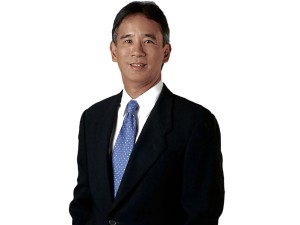‘Going down masa market is key to sustainable growth’

MAP Man of the year awardee Aurelio “Gigi” Montinola III says country must remember that seeing the peak is very different from scaling the peak, as can be learned from the Asian crisis which had thrown the country back to earth.
He has all the right DNA—plus of course the training and temperament—that shaped him into the exemplary banking professional that he is today.
Aurelio “Gigi” Montinola III got his banking genes from his paternal grandfather, Aurelio Sr., who helped establish the old Far East Bank (eventually bought by Bank of the Philippine Islands, which he heads) while his maternal grandfather Nicanor Reyes, founder of Far Eastern University, gifted him with education genes.
He had no need to seek employment elsewhere as he could have worked full-time at his family’s businesses, maybe manage FEU or the La Farge Cement group. But he chose to follow his own path outside what could have been a comfort zone.
His calling he found in banking, eventually rising to become president of Bank of the Philippine Islands—the country’s most valuable and profitable bank. Today, stock investors are willing to pay a hefty (some even say a crazy) premium for BPI’s shares and Montinola’s leadership is a big part of the equation.
Unsurprisingly, Montinola recently won the prestigious “Management Man of Year 2012” award from the Management Association of the Philippines, which recognized his “outstanding stewardship of BPI as a highly successful organization, a socially responsible corporate citizen and a fiduciary firm known for good governance.” He was also honored for his contributions in strengthening Philippine professional management practices by exemplifying strong culture of leadership, innovation and customer-centricity in the banking sector.
Montinola—who assumed presidency of BPI in 2005 and headed BPI Family Bank before that—was also recognized for the following:
Assisting overseas Filipino workers improve the management of their earnings through educational programs in saving, entrepreneurship and financial planning; Active involvement in micro-enterprise development through the provision of banking services designed specifically for small businesses and the least privileged segments of the Philippine economic pyramid; and central role in expanding BPI financing for energy efficiency and renewable energy projects, thereby significantly contributing to national development.
Apart from leading BPI, Montinola headed the influential Bankers Association of the Philippines from 2008 to 2012—arguably the most challenging episode for the local banking industry since the 1997 Asian crisis as this was when the US subprime crisis erupted with Wall Street as its epicenter and sent shockwaves to the rest of the world. He was thus cited by MAP for “leading the advocacy of financial reforms intended to further insulate the banking system from external shocks.”
He says that the Asian crisis taught the banking industry three things to avoid: Too much corporate leverage, too much bank leverage and too much foreign currency borrowing.
During the debt crisis years in the 80s, on the other hand, he reminisces that the government’s fiscal position was worse than where Greece is today. “Fortunately, many of the business leaders today went through one or both eras, and this clearly helped us in 2008, when the Philippines was only partially affected by the global financial crisis,” he says.
Overall, MAP says this award is to honor Montinola for “setting an example for Filipino professional managers through a track record of unblemished integrity, professional competence and strong leadership in his banking career.”
‘Noble Profession’
Montinola says it’s his father Aurelio Jr. who had given him “wings to fly” in a non- family business career while he credits his mother Lourdes, FEU chair, for the grounding of good values, great education and family ties.
During his MAP award acceptance speech before a high-powered crowd of businessmen and policy-makers, Montinola aptly points out management is “very much still a noble profession.”
“My parents’ generation were entrepreneurs; my generation has either been professional managers or overseas foreign workers, and I hope that my children’s generation will have the choice of being either an entrepreneur or a manager,” he says.
But for Montinola, giving up a career in family business was worth in exchange for employment in the Ayala group, which he opines is “clearly the best employer in town and the consistent breeder of high quality professional managers.”
After all, several others from this storied conglomerate have likewise reaped such honor in previous years: patriarch Don Jaime Zobel, Jaime Augusto Zobel de Ayala, Delfin Lazaro and Antonino Aquino.
Looking back, Montinola says it helps to start one’s career working under “tough” bosses. After college, he began his career under Francisco “Kaiku” Licuanan in Bancom.
After MBA and three years of international assignments, he returned to Manila in 1980 and had Vitaliano “Lanny” Nanagas in Citibank as a boss. He started his Philippine banking career with Citibank and then with BPI in 1982.
At BPI, he worked with Vic Pacis in corporate banking and then with predecessor Xavier Loinaz everywhere else. “All were demanding, never satisfied, and uncompromising; therefore, I learned the hard way how to get things done in an exceptional manner,” he says.
Also in retrospect, Montinola says cross-posting makes a big difference. Had he not been continuously cross-posted, he may have left banking and BPI a long time ago. Such reshuffling of work—a common practice within the Ayala group—seems to ensure that those being groomed for top management posts will be well-rounded.
In Montinola’s case, he did mostly corporate bank work in the 80s and primarily consumer bank work in the 90s. In the early 2000s, he focused on overseas banking and on learning treasury. In the mid- 2000s when he became president of BPI, his thrust was to go “down-market” further with small and medium enterprise lending and mobile micro finance, while learning asset management and insurance through internal meetings and external partnerships.
Under Montinola’s leadership, what was previously considered an “elitist” Spanish-era bank that was BPI has—slowly but surely—gone increasingly down market.
“Going down market or masa market is key to sustainable growth,” he says.
While it’s often said that experience is the best teacher, Montinola believes that continuous executive education is a big help to managers. “The world is changing so fast that one has to be continually updated with what is going on outside. I read a lot, but I also have helped upgrade the BPI training we do at all levels as well as the ‘nice to have’ foreign seminars we send key people to,” he says.
BPI has two bedrock training policies which all employees should attend and people are required to be cross posted to a different assignment within three to five years.
“The payoff for BPI has been big time. Instead of feeling the loss of 40 vice presidents and up in the past three years, we have seen the gain of 800 trained senior managers and up, and this has resulted in a gain of more than 40 equally capable vice presidents seamlessness stepping into the shoes of the retired 40,” he says, describing how cohesive BPI’s succession plan is.
Work life balance
In a 24×7 multitasking, listed life, Montinola is cognizant that work life balance is critical to maintain effectiveness at work. To stay in shape, he undertakes two days of physical training and one to two days of golf in a week. He tries to see many people for shorter periods of time but also delegates to equally capable senior executives many other meetings. In this regard, he’s grateful to long term secretary, Mariza Primicias, for keeping him within a 10-hour-a-day and no-weekend appointments.
“I don’t overdo technology— I do e-mail and text, and have an iPad, iPhone, and Blackberry, but I have no Facebook account and I rarely surf the Internet to ensure that I do not spend the four hours average time most people spend on Internet in today’s world,” he says.
To keep his well-being, he eats healthy food at home, so that he will have more leeway to eat and drink what he likes outside the house. He keeps many fascinating “nonbanking” friends in many areas which he says would make for equally stimulating conversations and interesting adventures. He travels extensively, both for pleasure and for business.
“Gaining insights into how things are done differently in another country has tremendously helped me in a personal and professional manner,” he says.
Method behind magic
To internally motivate and guide BPI employees over the years, Montinola cites a few key internal themes close to the heart of the organization. For instance, he says B-P-I means “Because People are Important.”
“We want BPI to be more accessible and more convenient for more Filipinos,” he says. The slogan “Let’s Make it Easy,” he says, is for both customers and bank employees.
“If you focus on customers and people, the business results will follow. As a 161-year-old bank, BPI’s mission is to help the customer, the community, and the country,” he says.
At present, he says Filipinos are fortunate to live in exciting times, with the Philippines “on the cusp of breaking into tiger economy and investment grade territory.” But he says the country must remember that seeing the peak is very different from scaling the peak, as can be learned from the Asian crisis which had thrown the country back to earth.
“Therefore, we cannot relax, and in fact must work even harder together to move the Philippines from today’s darling to tomorrow’s sustainable and inclusive growth model,” he says.

